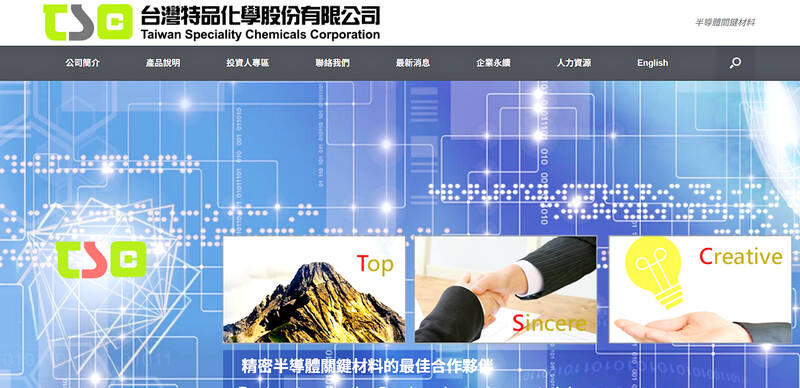Semiconductor specialty gas supplier Taiwan Speciality Chemicals Corp (台特化) expects revenue to grow 170 percent after acquiring a major stake in semiconductor parts cleaning company Hung Jie Technology Corp (弘潔科技) in a NT$3 billion (US$100.33 million) all-cash deal, a company executive said yesterday.
The deal would give Taiwan Speciality Chemicals a 65 percent share of Hung Jie Technology, which specializes in dry cleaning advanced semiconductor chamber parts used in the etching process. Maintaining cleanliness and applying appropriate coatings are vital to prevent particle contamination and device defects.
Hung Jie Technology, established in 2008, operates three factories in Tainan, Hsinchu County and Nanjing, China.

Photo: Screen grab from Taiwan Speciality Chemicals Corp’s Web site
The company cleans semiconductor parts made by the world’s five largest semiconductor equipment suppliers, Taiwan Speciality Chemicals said.
“The acquisition of Hung Jie Technology is entirely aligning with the company’s long-term development strategy” and contributes to revenue and profit growth, Taiwan Speciality Chemicals chairwoman Doris Hsu (徐秀蘭) told a virtual news conference.
Taiwan Speciality Chemicals reported NT$874 million in revenue for last year, a spike of 58 percent from the previous year.
About 80 percent of last year’s revenue came from selling disilane, while the remaining 20 percent came from distributing other companies’ gases and related services, the company said.
Hung Jie Technology’s revenue last year was about 1.7 times of Taiwan Speciality Chemicals’ revenue, Hsu said.
The company aims to double its revenue organically every three to four years and launch one new product each year, with a goal of having its revenue outgrow its share capital, totaling NT$1.4 billion, it said.
The company expects its new anhydrous hydrogen fluoride, a highly corrosive and toxic chemical compound used in the semiconductor industry’s etching and cleaning, to drive its revenue growth this year and the next two years.
The company expects to complete the Hung Jie Technology transaction next month and plans to fund the deal half through cash and half through a syndicated loan, it said.
It would be Taiwan Speciality Chemicals’ first acquisition and the company would continue seeking suitable targets going forward, Hsu said.
Taiwan Speciality Chemicals is 30 percent owned by solar module producer Sino-American Silicon Products Inc (SAS, 中美矽晶), which also holds about a 47 percent stake in the world’s No. 3 silicon wafer supplier, GlobalWafers Co (環球晶). Hsu is chairwoman of SAS and GlobalWafers.
The acquisition would broaden SAS’ footprint across critical semiconductor materials and process support capabilities, aiming to meet rising demand for precision in advanced chip manufacturing process nodes driven by demand for artificial intelligence and high-performance computing applications, SAS said in a statement on Friday.

Nvidia Corp chief executive officer Jensen Huang (黃仁勳) on Monday introduced the company’s latest supercomputer platform, featuring six new chips made by Taiwan Semiconductor Manufacturing Co (TSMC, 台積電), saying that it is now “in full production.” “If Vera Rubin is going to be in time for this year, it must be in production by now, and so, today I can tell you that Vera Rubin is in full production,” Huang said during his keynote speech at CES in Las Vegas. The rollout of six concurrent chips for Vera Rubin — the company’s next-generation artificial intelligence (AI) computing platform — marks a strategic

Enhanced tax credits that have helped reduce the cost of health insurance for the vast majority of US Affordable Care Act enrollees expired on Jan.1, cementing higher health costs for millions of Americans at the start of the new year. Democrats forced a 43-day US government shutdown over the issue. Moderate Republicans called for a solution to save their political aspirations this year. US President Donald Trump floated a way out, only to back off after conservative backlash. In the end, no one’s efforts were enough to save the subsidies before their expiration date. A US House of Representatives vote

Shares in Taiwan closed at a new high yesterday, the first trading day of the new year, as contract chipmaker Taiwan Semiconductor Manufacturing Co (TSMC, 台積電) continued to break records amid an artificial intelligence (AI) boom, dealers said. The TAIEX closed up 386.21 points, or 1.33 percent, at 29,349.81, with turnover totaling NT$648.844 billion (US$20.65 billion). “Judging from a stronger Taiwan dollar against the US dollar, I think foreign institutional investors returned from the holidays and brought funds into the local market,” Concord Securities Co (康和證券) analyst Kerry Huang (黃志祺) said. “Foreign investors just rebuilt their positions with TSMC as their top target,

REVENUE PERFORMANCE: Cloud and network products, and electronic components saw strong increases, while smart consumer electronics and computing products fell Hon Hai Precision Industry Co (鴻海精密) yesterday posted 26.51 percent quarterly growth in revenue for last quarter to NT$2.6 trillion (US$82.44 billion), the strongest on record for the period and above expectations, but the company forecast a slight revenue dip this quarter due to seasonal factors. On an annual basis, revenue last quarter grew 22.07 percent, the company said. Analysts on average estimated about NT$2.4 trillion increase. Hon Hai, which assembles servers for Nvidia Corp and iPhones for Apple Inc, is expanding its capacity in the US, adding artificial intelligence (AI) server production in Wisconsin and Texas, where it operates established campuses. This